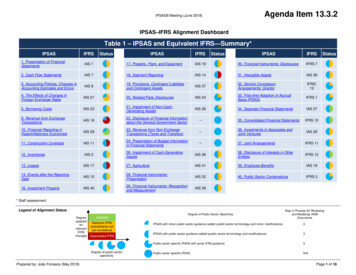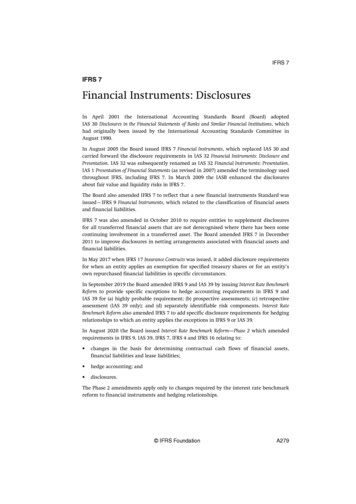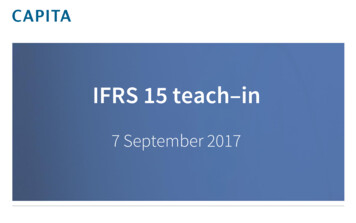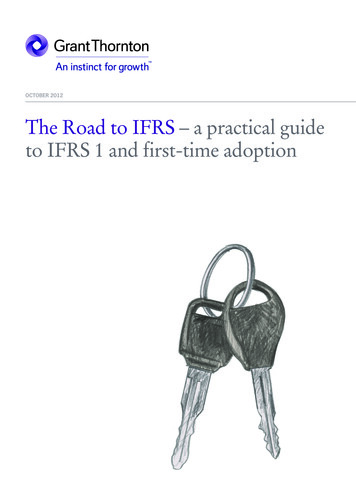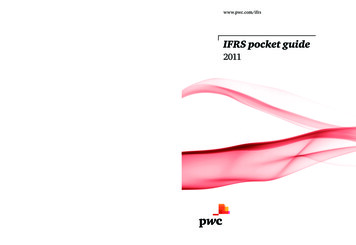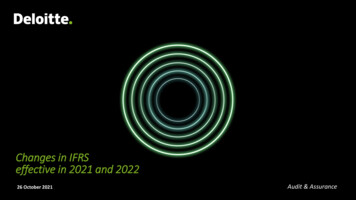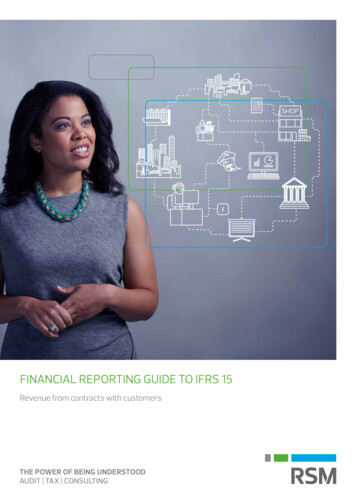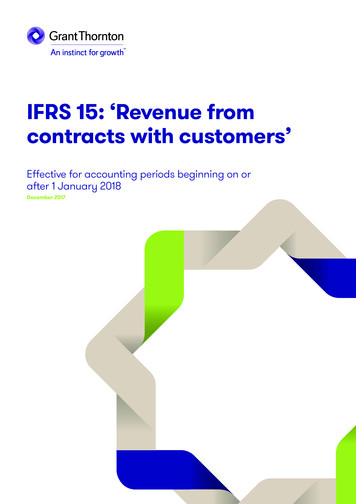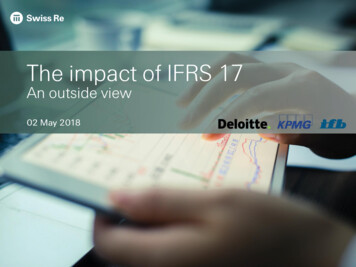
Transcription
The impact of IFRS 17An outside view02 May 2018
Topics to be covered in this session1. Brief recap of IFRS 172. How is IFRS 17 impacting various stakeholders?3. What are the implementation challenges for Asian Insurers?4. What is the journey ahead of us?2
How can weachieve theobjectives of thenew accountingstandards?3
1. Brief recap of IFRS 17The main benefits of IFRS 17 compared to the currentstandard (IFRS 4)Underwriting revenueand expenses arerecognised over time incomparable way toother non insurancebusinessProvides separateinformation aboutthe investment andunderwritingperformance54Provides up-to-datemarket consistentinformation ofobligation includingvalue of options andguarantees1Singleaccountingapproach2Reflects timevalue of money3Assumptions used in the valuation ofinsurance contract liabilities reflectthe characteristics of the insurancecontract rather than the risk relatedto asset / investment activity4
1. Brief recap of IFRS 17The new standard (IFRS 17) will have a bigger impact onsurplus and profit patterns compared to the currentstandard (IFRS 4)IFRS 17MeasurementDefinitionOtherDisclosureGeneral Model (Building Block Approach)Expected value of future cash flowsDefinition andscopeRisk adjustmentSeparationand contractboundariesContractual Service Margin (CSM)PresentationDiscount rateReinsuranceDisclosurePremium Allocation ApproachLiability forremainingcoverageRisk adjustmentTransitionDiscount rateCash flows of claim liabilityRisk-based capital framework (eg. Solvency, RBC etc)5
1. Brief recap of IFRS 17Presentation under IFRS 17 will change significantlywhich will also impact the business KPIs an example1Statement of comprehensive income1234Insurance revenue (Gross premium)Insurance service expenses (Gross benefit and claim paid)Investment incomeXExpected expenses (in fulfilment cash flows)XOther profit and loss itemsXCorporate tax(X)Profit after taxXOther comprehensive income(X)Total comprehensive incomeXExpectedAllocating premium relating to the recovery of directlyattributable acquisition costsExcluding investment components(X)Finance resultIFRS 17 / IFRS 4Expected claims (in fulfilment cash flows)(X)XInsurance finance expensesChange in risk adjustmentXInsurance service resultRelease in contractual service margin2Actual claims incurredActual expenses incurredAllocating premium relating to the recovery of directlyattributable acquisition costsActualOnerous contractsExcluding investment components3Calculated using locked-in rates (if the OCI option is selected)4Effect of discount rate changes on BEL (if the OCI option isselected)6
2. How is IFRS 17 impacting various stakeholders?IFRS 17 is impacting Asian insurers and their stakeholdersin multiple waysInvestors perspective: Revenue & Profit Profile,Capital, DividendBusiness perspective: Financial performance(actuals & planned), KPIs and ProductsIFRS 17Preparers perspective: Group and Localstatutory, Regulatory & Tax reportingOperational perspective: Finance, Risk, IT 7
2. How is IFRS 17 impacting various stakeholders?From an investor and business perspective, IFRS remainsIFRSis pillara key ofpillarthe insuranceinvestmentpropositiona keytheofinsuranceinvestmentproposition(and hence it will impact and may even change the valuation)Investor returnsDividendsValueCapitalEarningsLiquidityNet tionIFRS EPS /combinedratiosHoldingcompanyIFRSpay-out ratioBook valueper shareIASB: “Most investors and analysts welcomed theimprovements in financial reporting transparencyand comparability introduced by IFRS 17”Return onequity costof equityBusinessgrowth andfranchisevalue addIFRS returnon equityEV VNBOwn FundsBlackrock: “Since IFRS 17 is a principles-basedaccounting standard, it will take time for analystsand other users of financial statements tofamiliarize themselves with the new concept andmeasures of IFRS 17”8
2. How is IFRS 17 impacting various stakeholders?From a preparers perspective, most countries in Asia willfor sure apply IFRS 17 albeit with different timing1 Jan 20201 Jan 2021Date 2021Comparatives–Transition date forIFRS 17 & IFRS 9Effective date for IFRS17 and IFRS 9 (deferralapproach)Adoption likely buteffective date notdecided yetWe arehere 1.5 years to get readyNo intention toadopt IFRS 17:9
2. How is IFRS 17 impacting various stakeholders?Finally, from an operational perspective, several keyconstituencies will need to work more closely together Accounting policies / financial statementsShareddisclosuresNew COA, mappingtable, automatedcontrols RPA, etcFinanceIFRS17RiskITNew models andcontrolsActuarial systemupgradesSystemenhancement &interfaces10
2. How is IFRS 17 impacting various stakeholders?Also, many questions remain unanswered about thealignment of the multiple financial(statutory/regulation/tax) reporting requirements in AsiaRegulatoryReporting All Asian countries aredeveloping their ownregulatory framework(RBC, RBC 2, ICAAP –Internal CapitalAdequacy AssessmentProcess)? Will there be convergence ?under ICS – Risk basedInsurance CapitalStandards?IFRS 17ReportingTax Reporting Each Asian country hasits own tax framework,often based on the localstatutory reporting withcertain adjustments Almost all countries inAsia plan to convergetowards IFRS 17, albeitwith a differenttimeframe, and possiblydifferent local guidelinesWhat about EV –embedded value & VNB –value of new business?How will tax authoritiesadjust to IFRS 17?11
3. What are the implementation challenges for Asian Insurers?“Working on an IFRS 17 project feels a lot like crossing abridge while building it at the same time!”Source: public domain (related to “Building the bridge as you walk on it” book from Robert E. Quinn)12
3. What are the implementation challenges for Asian Insurers?Summary of the key IFRS 17 implementation challengesNeed to decide multiple accounting choicesAccounting& ReportingDetermine desired level of aggregationNeed to understand impact on productsModel changes to cater for new CSMDefinition of new KPI & managementscorecards changesChange ManagersProducts &BusinessFinance, actuary, technology, operations: Gettingall the required people involved and engaged atthe right time is key to a successful IFRS 17project deliveryMajor revamp of financial statements neededMuch of the current reporting will beimpactedOperations& SystemsData: availability & granularityHistoric data needed for in-forcebusiness to derive transitionadjustment for openingbalancesMultiple system choicesProject &ChangeManagers13
3. What are the implementation challenges for Asian Insurers?Accounting & Reporting: there are several new IFRS 17requirements that will be most difficult to implement forAsian ation& Disclosures14
3. What are the implementation challenges for Asian Insurers ?Products & Business: which lines of business will likely bemost impacted by switching to IFRS 17 ?Life System solution required for thepresentation & disclosureDifferent measurement modelsImpact on profit emergence andrevenue recognitionPensions P&C Less revenue impact as comparedto Life portfolioCF projection needed in themeasurement model(sameOnerous contract testingas Life)Falls partly under IFRS 17Different measurement modelsRevenue recognition impacteddue to significant investmentcomponentReinsurance Different contract boundary?Potentially different measurementmodels neededLinkage to underlying contractCompanies using high discount rates may also struggle with “market consistency” principle18
3. What are the implementation challenges for Asian Insurers?Operations & Systems: the selected level of aggregation(unit of account) has a fundamental impact on the systemdesign and operational data volumesHigh level ofaggregationLow level ofaggregationNeed to balance the pros & cons of a high versus low level of aggregation!16
3. What are the implementation challenges for Asian Insurers?Project & Change Management: Getting all the requiredpeople involved and engaged at the right time is key to asuccessful IFRS 17 project deliveryWhat are the key accounting &disclosure differences?FinanceWhat are the required data andsystem changes?OperationsProject &ChangeManagersTechnologyWhat are the main product andbusiness operationsimplications?ActuaryWhat are the required modelchanges and financial/productimplications?17
4. What is the journey ahead of us?18
19
Legal notice 2018 Swiss Re. All rights reserved. You are not permitted to create any modificationsor derivative works of this presentation or to use it for commercial or other public purposeswithout the prior written permission of Swiss Re.The information and opinions contained in the presentation are provided as at the date ofthe presentation and are subject to change without notice. Although the information usedwas taken from reliable sources, Swiss Re does not accept any responsibility for the accuracyor comprehensiveness of the details given. All liability for the accuracy and completenessthereof or for any damage or loss resulting from the use of the information contained in thispresentation is expressly excluded. Under no circumstances shall Swiss Re or its Groupcompanies be liable for any financial or consequential loss relating to this presentation.20
IFRS return on equity EV VNB Own Funds Book value per share IFRS is a key pillar of the insurance investment proposition (and hence it will impact and may even change the valuation) From an investor and business perspective, IFRS remains a key pillar of the insurance investment proposition 2. How is IFRS 17 impacting various stakeholders?



